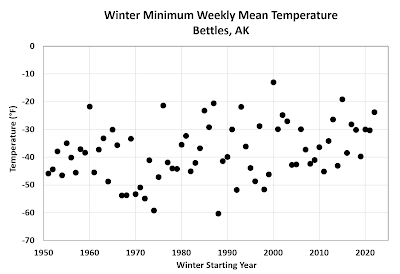The cold snap appears to be reaching its nadir this weekend for the western and northern interior. This morning's temperatures bottomed out in the -50s Fahrenheit for many locations from as far south as Nikolai up to the Kobuk River valley and eastward to the Yukon Flats. The coldest spots in Fairbanks-land dropped to near or just below -50°F, although the airport only made it to -40°.
With more than a month having passed since the solstice, afternoon sunshine allowed for temperatures to recover somewhat this afternoon, but less so in the northern interior, and Bettles saw a high temperature of -47°F. It's fairly late on the calendar for this: the latest date in Bettles with such a cold high temperature is February 3rd (1993).
This morning's 500mb chart from Environment Canada shows the mid-atmosphere situation, with a deep, cold trough over central and northern Alaska.
This afternoon's 500mb height of 4950m on the Fairbanks sounding is the lowest in 7 years.
I mentioned the other day (prompted by Rick Thoman's comment) that really significant cold snaps are relatively uncommon during El Niño winters. Here's a look at some data to illustrate that point: the chart below shows each winter's lowest weekly (7-day) mean temperature for Fairbanks and Bettles combined (i.e. the average of the two sites). The colors indicate El Niño or La Niña winters, as defined by the December-January Multivariate ENSO Index being above +0.5 or below -0.5 respectively.
It's clear that for the seven decades as a whole, La Niña winters have tended to produce colder cold spells, although admittedly the evidence is only compelling from about 1980 through 2010. In the 1950s, 60s, and 70s there were some nasty cold spells with El Niño, and in recent years La Niña hasn't produced anything like the cold that it used to.
The result is similar if we classify years based on the Oceanic Nino Index, which uses only Niño3.4 SSTs as an index of ENSO strength.
Either way, we find a difference of about 5-6°F on average between the coldest weeks in El Niño versus La Niña winters; but there is obviously a lot of variability between winters, and from decade to decade.
The disappearance of the most severe cold in recent decades is remarkable. Here's a chart showing all winters:
The current cold snap will break the sharp uptrend, but perhaps only marginally; we'll see.
The Fairbanks urban heat island is certainly a factor here, but the trend is only about 20% greater for Fairbanks than it is for Bettles (+1.8°F/decade vs +1.5°F/decade for the coldest weekly temperatures).






Yeah it's cold, just fed the dogs and it was -40 outside. Kind of ironic cause we live in the hills NE of Fairbanks and we're usually 5-10° warmer than town. Well it'll warm up eventually and then we'll complain about the bugs!
ReplyDeletehttps://www.severe-weather.eu Root around here for some observations re cold here vs wet in SE AK. Truly my confidence in El Nino for warm has been altered. Why later - please?
ReplyDeleteI've always been fascinated with the far North. Is there any "benefit" for such cold snaps for the flora and fauna up there in interior AK? Growing up in NH, data suggest our lack of regular wintertime subzero cold snaps in recent decades may be exacerbating issues with ticks, and tick borne diseases, along with invasive plants from further south to become established, so I always wonder about the impacts on Alaska with the departure of regular wintertime deep freezes.
ReplyDeleteGreat question Brendan. I'm no biologist but I suspect the main benefit of severe cold would be minimal competition from less hardy organisms. Warming allows cold-adapted ecosystems to get replaced.
DeleteLoss of permafrost (related to reduced incidence of severe cold) is obviously also a profound issue with diverse impacts.
Google provides many suggestions for further learning, e.g.
https://www.nps.gov/articles/000/aps-22-1-3.htm
Thanks Richard! I'm a longtime lurker on this blog, so thanks for all you do here!
Delete